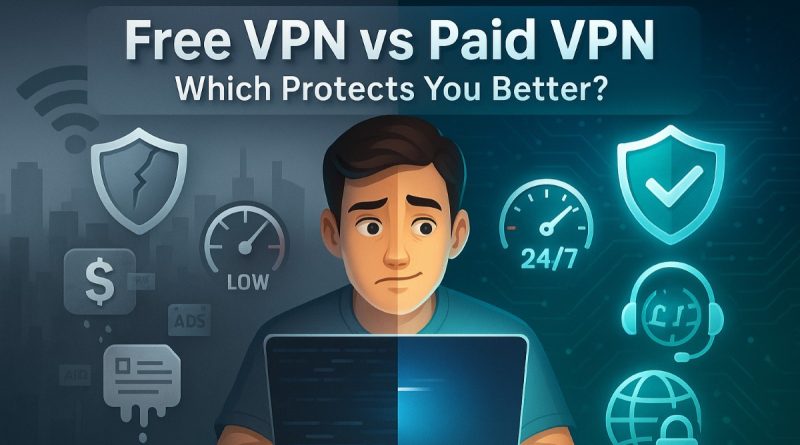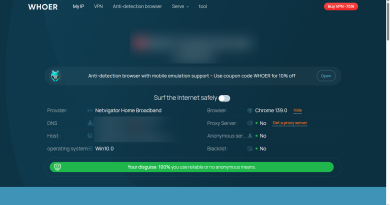Free VPN vs Paid VPN: Which One Should You Use
In 2025, online privacy and security are more important than ever. Whether you’re browsing the web, streaming your favorite shows, or working remotely, a Virtual Private Network (VPN) has become an essential tool. A VPN encrypts your internet connection, hides your IP address, and protects your data from hackers, advertisers, and even your Internet Service Provider (ISP).But when choosing a VPN, many users face a common dilemma: Should you use a free VPN or a paid VPN?Both have their pros and cons. Free VPNs seem attractive because they don’t cost anything, but they often come with serious limitations. Paid VPNs, on the other hand, provide premium features, but they require a subscription.This article provides a complete comparison of free vs paid VPNs, helping you decide which option suits your needs best.
What is a VPN and Why Do You Need One?
A VPN creates a secure, encrypted tunnel between your device and the internet. This ensures that your online activities remain private, secure, and anonymous.
Benefits of Using a VPN:
-
Privacy – Hides your real IP address.
-
Security – Protects your data from hackers and cybercriminals.
-
Streaming Access – Unblocks geo-restricted platforms like Netflix, Hulu, or BBC iPlayer.
-
Safe Public Wi-Fi – Shields your data when using cafes, airports, or hotels.
-
Bypass Censorship – Access blocked websites in restrictive regions.
Whether you choose a free VPN or a paid VPN, these are the main reasons people use them.
Free VPNs: Pros and Cons
Free VPNs attract millions of users worldwide because they cost nothing. However, there’s no such thing as truly free technology—most free VPN providers still make money, often in ways that compromise your privacy.
Pros of Free VPNs:
-
No Cost – Completely free to use.
-
Beginner-Friendly – Quick to install and use.
-
Basic Protection – Provides minimal security for light browsing.
-
Testing Purposes – Good for trying VPNs before committing to a subscription.
Cons of Free VPNs:
-
Limited Data Allowance – Many free VPNs restrict usage (e.g., 500MB–2GB per month).
-
Slow Speeds – Free servers are overloaded with users, reducing performance.
-
Fewer Servers – Limited access to global server locations.
-
Weak Security – Many free VPNs lack advanced encryption and leak protection.
-
Privacy Risks – Some free VPNs log user activity and sell data to advertisers.
-
No Streaming Support – Rarely works with Netflix, Hulu, or BBC iPlayer.
-
Annoying Ads – Many free VPNs inject ads into your browsing sessions.
Free VPNs are best for occasional, low-risk browsing, but they are not suitable for streaming, gaming, or handling sensitive information.
Paid VPNs: Pros and Cons
Paid VPN services are built for reliability, privacy, and performance. Providers like ExpressVPN, NordVPN, and Surfshark dominate the market because they offer professional-grade features.
Pros of Paid VPNs:
-
Unlimited Bandwidth – No data restrictions.
-
High Speeds – Optimized servers for streaming, gaming, and downloading.
-
Global Server Network – Thousands of servers worldwide for better connectivity.
-
Advanced Security – Military-grade encryption, kill switch, and DNS leak protection.
-
Strict No-Logs Policy – Reputable providers don’t track or sell your data.
-
Streaming & Torrenting – Access geo-blocked platforms and P2P networks easily.
-
Multiple Devices – One account works across phones, laptops, and routers.
-
Customer Support – 24/7 live chat and technical support.
Cons of Paid VPNs:
-
Subscription Cost – Monthly or yearly payments required.
-
Learning Curve – More features may overwhelm beginners.
-
Not All Paid VPNs Are Equal – Some cheap providers may still log data.
Paid VPNs are best for serious internet users—those who stream, game, work remotely, or prioritize privacy.

Free VPN vs Paid VPN: Side-by-Side Comparison
| Feature | Free VPN | Paid VPN |
|---|---|---|
| Cost | $0 | $3–$12/month |
| Data Limits | 500MB–2GB/month | Unlimited |
| Speed | Slow, overcrowded | Fast, optimized |
| Servers | Few (5–20 locations) | Thousands worldwide |
| Security | Basic, often weak | Advanced, military-grade |
| Privacy | Often logs data | No-logs policies |
| Streaming Access | Rarely works | Unblocks Netflix, Hulu, etc. |
| Torrenting | Usually blocked | Allowed with dedicated servers |
| Ads | Frequent | Ad-free |
| Customer Support | None or email only | 24/7 live chat |
When to Use a Free VPN
Free VPNs are suitable for:
-
Occasional browsing.
-
Accessing basic blocked websites.
-
Testing VPN technology before upgrading.
-
Low-risk tasks like reading articles or checking social media.
They are not ideal for:
-
Streaming Netflix or YouTube in HD.
-
Online banking or sensitive transactions.
-
Professional work requiring stable connections.
-
Heavy downloads or gaming.
When to Use a Paid VPN
Paid VPNs are better for:
-
Streaming & Entertainment – Bypass Netflix, Hulu, Disney+, and BBC iPlayer restrictions.
-
Remote Work – Secure connections for business and sensitive data.
-
Travelers – Access home-country content and services abroad.
-
Heavy Internet Users – Unlimited data for gaming, torrenting, and downloads.
-
Privacy-Conscious Users – Strong protection against tracking, hacking, and surveillance.
Risks of Using a Free VPN
-
Data Logging – Some free VPNs secretly track and sell your browsing history.
-
Malware – Risk of downloading fake VPN apps infected with malware.
-
Weak Encryption – Leaves your data vulnerable to hackers.
-
Unreliable Service – Frequent disconnections and server shutdowns.
Studies have shown that over 70% of free VPN apps on app stores have links to third-party data brokers.
Why Paid VPNs Are Worth It
Although they cost money, paid VPNs are worth it for:
-
Peace of mind.
-
Reliable speeds for streaming/gaming.
-
Strong encryption to protect sensitive data.
-
Consistent access to blocked content worldwide.
With most subscriptions averaging $3–$5/month on annual plans, the cost is minimal compared to the security and freedom you gain.
Conclusion
When it comes to Free VPN vs Paid VPN, the choice depends on your needs:
-
If you only need basic, occasional browsing protection, a free VPN may be enough.
-
But if you value speed, security, privacy, and unrestricted internet access, a paid VPN is the clear winner.
In today’s digital world, where cyber threats and data surveillance are increasing, investing in a reliable paid VPN is one of the smartest decisions you can make for your online safety.
FAQ: Free VPN vs Paid VPN
Q1: Is it safe to use a free VPN?
Some free VPNs are safe, but many collect and sell user data. Always research before downloading.
Q2: Can free VPNs unblock Netflix?
Very few can. Most free VPNs are blocked by streaming platforms due to limited servers.
Q3: How much does a paid VPN cost?
On average, $3–$12/month depending on the provider and plan.
Q4: Do paid VPNs really keep no logs?
Trusted VPNs like NordVPN, ExpressVPN, and Surfshark have strict no-log policies, often verified by audits.
Q5: Which option is best for gamers?
A paid VPN is recommended for gaming because of lower latency, faster speeds, and better security.




